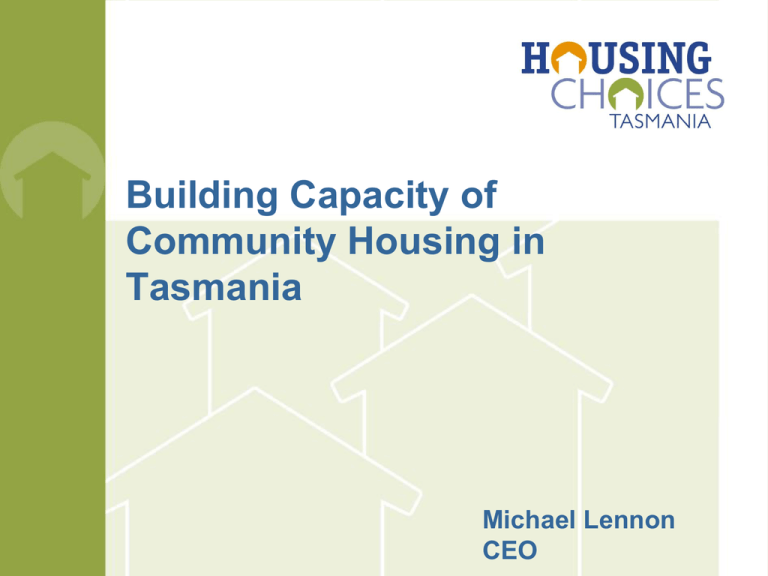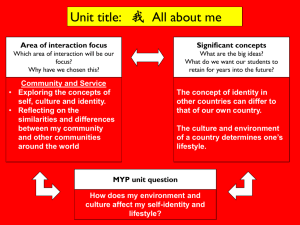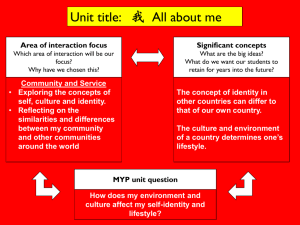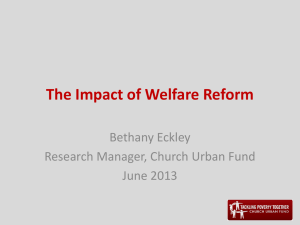Shelter Tasmania ML 13 7 11
advertisement

Building Capacity of Community Housing in Tasmania Michael Lennon CEO Why Private Finance? • Decline in public funding • ‘De-politicising’ housing • Commercial disciplines via Corporations Act and Directors Duties How Public Interests are Protected • Arises as a consequence of capital funding from government • Keep property used for its funded purpose • Claim over proceeds if property is sold • Right to transfer asset to another HA if there is a failure of the HA • Can be created by statute or by contract (or both) Historical means of protecting interest • Mortgages • Charge/Caveat • Planning instruments These rights were usually connected with the terms of funding New means of state’s interest Victoria: Sections 107-110 of the Housing Act 1983 (2005) NSW: section 67HA – 67N Housing Act 2001 (2010) • SHA has interest in land where: • It has transferred that land to the HA; or • Where HA has agreed to it in a funding agreement. • HA must not transfer, sell, lease, mortgage, charge or otherwise deal with land in which SHA has an interest. Consent will not be unreasonably withheld. • Interest may be recorded on title. • NSW provisions also allow SHA to remove interest from title, and create a charge in a community housing agreement which may also be registered on title. So what is this interest? • Not a traditional interest in land (mortgage, charge) • Novel interest created by special statutory provisions • Constitutes a restrictions on dealing with the land – different to a mortgage/charge which includes a power of sale and creates priority over other creditors • Not strictly necessary since a mortgage over the property could have the same effect – therefore this could be created by contract Approach in other jurisdictions WA: – • Community Housing Agreement creates charge over land, SHA may register caveat on title in respect of that charge. • SHA may also register restrictive covenant requiring land be used for community housing SA: – • South Australian Housing Trust Act enables deed of statutory covenant to be registered on title to land. • South Australian Co-Operative and Community Housing Act enables registration of a charge over title to land in favour of SHA to secure funding covenants Impact on raising finance • Bank will require first-ranking security over which they may exercise their power of sale • Land must be capable of being sold unencumbered to maximise its value as security • Tripartite or deed: • Priority of interests • Notice by lender to state if HA defaults and cure period • Cancellation of recording in register if bank exercises power of sale Security Trust • Mortgages held by Security Trustee • One tripartite agreement between state housing authority and Security Trustee to manage priority of interests • Multiple security pools can be created • Property can be removed/added from security pool without having to discharge or grant new mortgages Other implications of Security Trusts • What is meant by “will not be unreasonably withheld”? • Implications for asset planning – e.g. sale of assets to regenerate other stock and potential loss of unit numbers • Contingent liabilities in funding deeds • Implications for duties for directors Housing Choices Australia • Owns more than 1,100 properties and manages an additional 550 properties • Merger of four affordable housing organisations to maximise growth opportunities by State and Federal policy settings. • Integrated property development, property and rental management services • Constructed 460 new units since June 2009 and finalising contracts for 190 units. Housing Choices Australia Key Target Groups are people: • with a range of disabilities; • priced out of housing market (i.e. inner city and central activity districts); or • in neighbourhoods of multiple disadvantage. • The net asset position of HCA is valued at $433 million • Debt facilities in place of $50 million • Asset growth of 69% in past two years Funding Models • Product is no different to standard market product • Nation Building Social Housing Initiative – 75% Govt Funds and 25% Housing Association (VIC) • Capacity to raise additional revenue from: o State and Commonwealth rental subsidies (National Rental Affordable Scheme and Commonwealth Rent Assistance) o o o o Equity contributions (cash or land) Sales to private market Unencumbered stock Investment loans secured to deliver additional units Development Opportunities • Inclusionary zoning • Redevelopment of under utilised properties • Blended redevelopment of public housing estates • Outsourced management of public housing estates Springfield Road, Croydon (10) 10 x 2 bedroom apartments Completed: November, 2010 Shepparton Parkside (6) 6 x 3 bedroom houses Completed: September, 2010 Nelson Street, Ringwood (36) 12x1 bedroom & 24x2 bedroom apartments (4x Fully Accessible 4x Universal Apartments) Completed: December 2010 79A Raglan Street, Daylesford (3) 2 x 1 Bedroom & 1 x 2 Bedroom Completion Date: June 2011 Freshwater Drive, Craigieburn (8) 6 x 3 & 2 x 2 bedroom Townhouses Completion Date: 5th November, 2010 New Quay, Docklands (85) 42 x 1 & 43 x 2 bedroom apartments Completion Date: June, 2011 Cottrell Street, Werribee (15) 6 x 2 bedroom & 9 x 3 bedroom villa units Completion Date: 7th December, 2010 Drill Hall Redevelopment (59) 51 x 1 Bedroom units & 8 x 2 Bedroom units Completion Date: November, 2011 Housing Choices Tasmania – Funding Model • Government Outsourced Tenancy Management Plan. • 138 Housing Tasmania units leased for 3 years. • Surplus net rental income, Commonwealth Rent Assistance and debt funding are combined to deliver further units for low income tenants. • Within the 3 year lease, HCT intends to deliver an additional 40 units into the Tasmanian market – 25 this year. Housing Choices Tasmania – Funding Model • HCT debt is guaranteed by HCA. • HCT is newly established in Tasmania - logical decision to collaborate with a local organisation. • Tenancy management provided by Colony 47. • Both parties bring their respective strengths to the project. Title Transfer or Not? • An evolving policy, Government will need to be prudent. • Protecting tenants interests. Perceptions of current and new landlord • Management of Government’s asset base - credit ratings and debt borrowing ability. Recorded as a loss in Government’s financial statements. Title Transfer or Not? (contd.) • May enable Community Housing providers to secure debt finance facilities and greater control with property management. • Transfers the long term maintenance liability from the Government to the Community Housing provider. Title Transfer or Not? (contd.) Another Option: Lease arrangement similar to the Housing Provider Framework in Victoria. • Community Housing provider has access to rental cash flow and CRA and is responsible for all maintenance except structural. • Part of gross rental income (approx. 20-25%) is returned to the Government to fund structural maintenance etc. Risks For government Assets Performance For tenants Affordability Reliability Empowerment Risks For banks Reputation Solvency Governance For providers Capability – people, systems, governance. Commerciality – Directors’ duties, lending covenants, leverage Retaining organisational values Building partnerships and relationships Conclusion • Exciting times, great potential, but… • There are risks for everyone • Non-market tenancy management is relatively straightforward • Ownership, development, private funding and Directors duties introduce much greater complexity • This is key to the next evolution of the sector Creating Communities…











